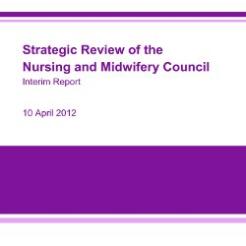The interim report looking into the failure of the Nursing and Midwifery Council to successfully undertake its statutory duties has found that the regulating charity is "confused over its regulatory purpose and lacks clear, consistent strategic direction".
The NMC review comes at a time when the regulator, which oversees the work of 670,000 nurses and midwives and employs over 400 staff, is functioning with an interim chief executive and chairman.
The report, compiled by the Council for Healthcare Regulatory Excellence, finds fundamental flaws in the leadership, financial control, transparency, business systems and in relationships within the organisation, which is tasked with safeguarding the health and wellbeing of those using health services.
CHRE was commissioned by the Parliamentary Under-Secretary of State at the Department for Health to review the Council following "difficulties in high quality performance of its statutory duties for many years". The last time this was done was in 2008 when the CHRE identified a number of fundamental problems with the regulator, sparking the resignation of the organisation's then-president Nancy Kirkland and chief executive Sarah Thewlis.
This year's review has instead been preceded by "significant turnover" at director level in the past year, resulting in half of its roles filled by interim or acting-up directors, the report found. This includes the resignation of the chair, Professor Tony Hazell, who announced his departure in mid-March 2012 and was replaced by Professor Judith Ellis as acting chair at the end of that month, and chief executive Professor Dickon Weir-Hughes, who was replaced by Jackie Smith as acting chief executive in December last year.
'Dysfunctional relationships endemic'
The NMC is served by a Council, led by the chair, and the executive, led by the chief executive. The CHRE found, through interviews with relevant parties and reviewing minutes, that the Council and executive have been constrained from exercising effective leadership due to a combination of "unsatisfactory and sometimes dysfunctional relationships" that have been "endemic" at the regulator for many years, as well as a lack of insight by the chair, chief executive and Council.
It found that the chair was "too aligned with the chief executive" and that Council members felt "disempowered" and "discouraged from challenging the executive".
Data and transparency
The substandard relationships were coupled with a lack of transparency over decision-making, CHRE found. It also stated found the quality of performance data and papers for the Council were not sufficient to make effective decisions. There was a lack of consistency over reporting in terms of layout, data and trend analysis preventing the ability to draw clear comparisons.
The corporate plan devised for 2011 to 2014 was also criticised by CHRE for a lack of "commentary" giving staff direction in what they needed to do in order to achieve the goals outlined. The NMC, the report advised, "does not have a clear understanding of what success looks like", advising that its performance measures are "not significantly aligned with the NMC's regulatory objectives".
Ambitions for expansion distract from core aims
The NMC took on a number of additional "ambitious" projects which "do not support the primary regulatory objective", CHRE advised.
Projects given as examples include an index of nursing students and campaigning for statutory regulation of healthcare support workers.
"An efficient, mature regulatory body with strong leadership might have had the capacity to stretch to accommodate additional projects, had they been in the public interest, but the NMC has not been in that position," it added.
Financial strategy
The NMC faces its numerous leadership and strategy issues against a backdrop of tough financial constraints and with a reported increase in referrals of 52 per cent in the past two years. The CHRE advises that a significant proportion of NMC's annual expenditure will be required to address the backlog of cases resulting from the poor management of the organisation. But, it says, "it is imperitive that a clear financial strategy is developed, which supports the regulatory purpose within the confines of the limited funding available at present".
Recommendations
The interim report will feed into the final report due to be published in June, but already makes a number of recommendations to improve the situation at the regulator.
CHRE advises that a priority for the NMC is to appoint a permanent chair and chief executive as soon as possible and to put in place a transition team to strengthen expertise in risk management and support the new chief executive and report to the Council. The executive management team should also be restructured to make it more effective and accountable, and matters should be considered at public Council sessions except where matters of confidentiality prevent that from being the case.
It recommends that to address a lack of people with financial expertise at governance level within the organisation the appointment of at least one member of the Council with financial expertise is necessary. Financial management must be improved with a focus on making a clear link between operational activity and financial outcomes.
Fundamentally the organisation "needs as a whole organisation to have a clear and consistent focus on its regulatory purpose", CHRE advises. "It needs to not only clearly articulate its values, but also to ensure that they are understood throughout the organisation," it adds.
NMC response
Upon publication of the report yesterday, NMC's interim chair Professor Judith Ellis said:
"This interim report emphasises the need for the NMC to focus its purpose as a regulator and turns a spotlight on serious problems in our governance, financial strategy and management information. We accept the report's findings in its entirety and we are already working hard to address the recommendations."









